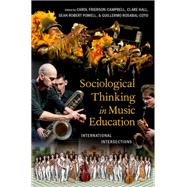Sociological Thinking in Music Education presents new ideas about music teaching and learning as important social, political, economic, ecological, and cultural ways of being. At the book's heart is the intersection between theory and practice where readers gain glimpses of intriguing social phenomena as lived through music learning and teaching. The vital roles played by music and music education in various societies around the world are illustrated through pivotal intersections between music education and sociology: community, schooling, and issues of decolonization.
In this book, emerging as well as established scholars mobilize the links between applied sociology, music, education, and music education in ways that intersect the scholarly and the personal. These interdisciplinary vantage points fulfil the book's overarching aim to move beyond mere descriptions of what is, by analyzing how social inequalities and inequities, conflict and control, and power can be understood in and through music teaching and learning at both individual and collective levels. The result is not only encountering new ideas regarding the social construction of music education practices in specific places, but also seeing and hearing familiar ones in fresh ways. Digital assets enable readers to meet the authors and the points of their inquiry via various audiovisual media, including videos, a documentary music film, and multi-lingual video précis for each chapter in English as well as in each author's language of origin.








